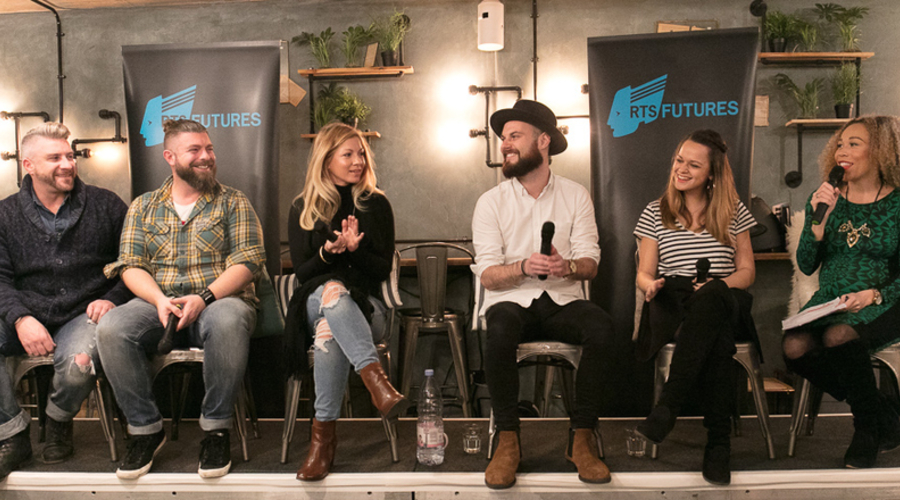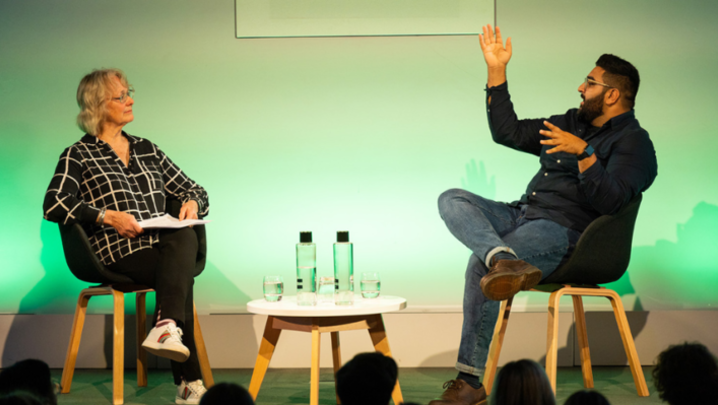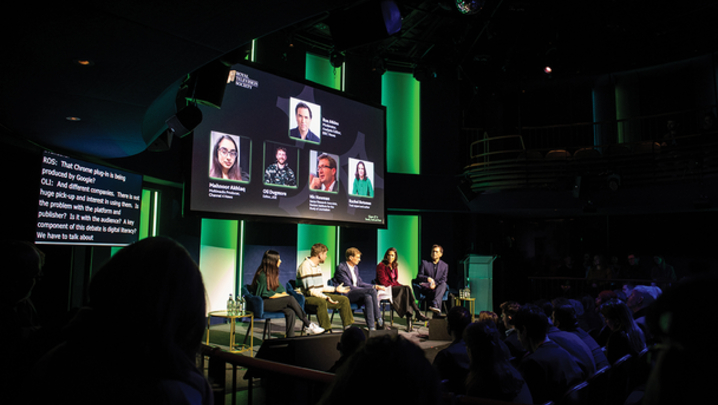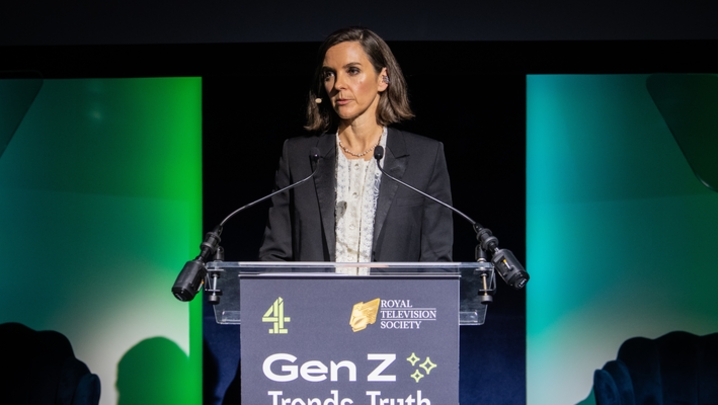Channel 4’s First Dates revels in its documentary roots. Matthew Bell feels the love
It’s much more interesting to watch people fall in love than fight,” said producer Molly Sayers at an RTS Futures event in late November, which turned the spotlight on Channel 4’s popular First Dates.
The Twenty Twenty Television production is that rare thing among dating shows: it wants audiences to like, not laugh at, its lovelorn participants.
“The programme comes out of the docs department of Channel 4 so it’s not an entertainment programme, although it is entertaining,” said Sayers, who produces the series. “As much as it’s about love, dating and the funny, flirty, sexy things happening in the restaurant, it is a documentary about people.”
First Dates has been a regular TV presence since its debut in June 2013, and has racked up more than 70 episodes, including various specials and celebrity shows.
Dan Muncaster-Ross and Adam Stewart are the programme’s poster boys. They met on the show in 2015 and Muncaster-Ross moved 250 miles to live with his beau in Bury St Edmunds. The couple were engaged by the end of the year. Now they are planning a wedding in Cape Town in early 2019.
Recalling his audition for the show, Stewart said: “I was so honest and answered every question – they do ask for every single detail [about yourselves that] you can imagine.”
“Intimate details,” clarified Muncaster-Ross.
“The process was so quick,” said Stewart. “It was three weeks from getting a phone call [from the programme-makers] to meeting Dan.”
Muncaster-Ross applied to appear on First Dates after watching an episode with his flatmate and sharing a couple of bottles of wine – and then forgot all about it.
Two months later, he received a call and went to an audition in Newcastle; more time passed before he was called to London for another audition and accepted by the show.
Despite being filmed for national TV, the two men didn’t feel at all awkward on their restaurant date. “There is no camera crew walking around. There are static cameras, a bit like Big Brother, scattered about.
“When I first got there I thought, ‘Oh God, there’s cameras everywhere,’ but as soon as Dan turned up I totally forgot about them,” said Stewart.
Muncaster-Ross added: “Because it’s a date, you want to impress the person that you’re with. They’re in front of you, so you just forget everything else that is going on. Until you get up to go to the loo and then you think, ‘Oh my God, there’s a camera on me.’”
The waiters and maître d’ Fred Sirieix are employed by the programme-maker and are an integral part of the show. Actor Cici Coleman – one of the panellists at the RTS Futures event – explained to the evening’s chair, TV presenter Ria Hebden, how she was recruited as a waitress.
“I was serving a table and they happened to be a street-casting team from Twenty Twenty. I didn’t realise who they were and I was just chatting away,” recalled Coleman.
They offered her an audition for the third series of First Dates – which Coleman had not heard of. The format was being tweaked and the restaurant staff were to become part of the show.
“Series 1 and 2 had been less of a hit,” admitted Sayers. “Series 3 was Channel 4’s last push – it was a good idea but it wasn’t quite there.”
Featuring the restaurant staff, she explained, “oxygenates” the show. “Going from date to date, no matter how great the casting was and how good the stories were, had left viewers [feeling] frazzled.”
Coleman thought the casters were joking: “No one ever comes to you [with a job] – you have to go to them.”
She went for an audition with Sayers and was offered the job. Her role is not only to serve food but also to chat with the daters and help them to relax.
“The only way that we know what’s going on in the [daters’] heads,” said Sayers, “is via Cici or [another waiter] at the table asking, ‘Do you like them?’”
She offered hope to any member of the RTS Futures audience looking for a route into television: “It’s a juggernaut of a production. We see up to 80 [potential daters] a week and we always need help, so there are logging positions and, on the actual shoot, there are [opportunities] for runners.
“In terms of getting a toe in [this industry], it is a good way in.”
Sayers is herself proof that researchers on First Dates can make their mark on the industry. She was a researcher on the first series, worked elsewhere to gain further experience, and returned as an assistant producer, before being promoted to producer.
The making of First Dates
Casting producer Alex Gray picks the daters and oversees the matching process on First Dates. He uses the show’s casting database of more than 150,000 people to come up with potential participants, who he supplements with street casting.
‘We spend a long time on the phone with people before we even meet them,’ Gray explained. ‘When they do come in, we treat our auditions as if we were down the pub with a mate so that they are as relaxed as possible.’
He added: ‘You can match them on paper but it’s a lot easier when you know them.’
Every week, the production team holds ‘match meetings’, where they ‘fight over their favourites. It can get really heated but that’s a good thing because it means we’re passionate,’ said Gray. ‘That’s why the show is so successful and creates so many successful matches.’
Indeed, the programme’s production team looked back at series 3 and 4, and discovered that around 80% of couples went out together again at least once after appearing on the show.
"It’s not an exploitative programme in any way and that’s the joy of working on it"
The series is filmed at a restaurant in Paternoster Square near St Paul’s in London, which the production team take over a week before filming starts.
Seven dates are filmed for each episode, although only five make it to the screen, and two episodes are canned each day.
At any one time, three featured couples are filmed in the restaurant by 42 fixed, remotely operated cameras. There are also GoPro cameras in the toilets, which turn on when a featured dater enters.
The production team, however, can record only 10 streams; three streams for each couple to get both close-ups and wide shots, and one to record the waiters. The restaurant is filled out by other couples, who are also on first dates.
‘We have to monitor how pissed people are,’ said Sayers. ‘We’ve worked so hard to get the daters to this point, so we don’t want them to be smashed.
‘Generally, however, we leave people to it because it is a documentary. People do get a bit pissed on a date or nervous or a bit sexy, but that’s OK.
‘We’re just there to help and look after them – we don’t want them to do anything that they might regret.’
After a date has been filmed, the production team keeps in touch with the daters, especially during the editing process, until the show airs.
‘It’s not an exploitative programme in any way and that’s the joy of working on it,’ said Sayers. ‘You really want [daters] to fall in love. You want to see your months of hard work end in a Dan and Adam moment.’
The RTS Futures event, ‘First Dates: Uncovered’, was held at The Collective in Central London on 23 November and was produced by Sasha Breslau and Alex Wootten.







